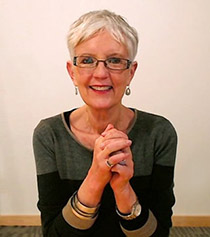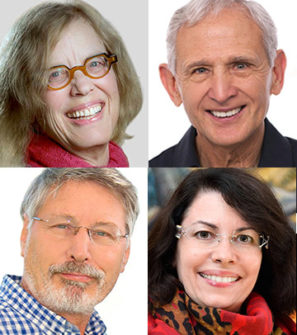How to Work with the Limbic System to Reverse the Physiological Imprint of Trauma
 |
with Pat Ogden, PhD ;
|
 |
with Pat Ogden, PhD; Peter Levine, PhD; Bessel van der Kolk, MD; Ruth Lanius, MD, PhD; and Ruth Buczynski, PhD
Sign up for a Gold Membership

The most insightful and useful information I’ve come me across to date. If I had the means to purchase the gold subscription, I absolutely would. I’d like to thank Ruth and everyone involved in bringing this information to the forefront, especially to those who could not afford to purchase it. Your dedication and hard work is greatly appreciated
Dear Ruth, Pat, Peter, Bessel and Ruth
Thank you for an incredibly interesting and informative programme. I work with traumatised clients all the time. South Africa is suffering an epidemic of trauma and violence, and what I have gained from your programme is invaluable in terms of the work I do with my clients. Thank you all for your incredible generosity of spirit. I have not signed up for the Gold subscription because I cannot afford to, but I watched each programme twice to make sure I did not miss anything. Once again, thank you so much.
Sincerely, Kailas
I enjoyed the great learning in the seminar and love that we can use simple things like movement and embodiment to heal.
Thank you so much to the NICABM for this extremely valuable information. As a bereaved mom living with PTSD from the suicide of my daughter in 2005, I am always eager to learn the latest about trauma and share what I can of this information within the grief community. The turning point for me in understanding trauma in general was Dr. van der Kolk’s book The Body Keeps the Score. This webinar series has helped me gain even better insight about the treatment of trauma through the many resources and tools shared. I know all that I have learned will contribute greatly to the healing journey ahead for me and my family. Thank you.
Dear Professors,
The whole course has been a treasure, and my notes so will be. For the moment, and since I’m inside a government program that seeks to attend marginal population in Mexico Cit, every piece of your experience will be helpful (the very difficult economic situation now in the country has made impossible for me to buy the program for the moment, but in the very first moment I can, I will). And it has been already valuable in my classroom, since I imparted a seminar about intercultural communication -mosto of all around hidden fears and traumatic social memories- in a periphery campus of the Autonomous University of Mexico City (UACM as in Spanish), near two jails in the northern part of the city, and where the students life in an all-day-long-stressful situation: some of them don’t even tolerate me coming near them. Some of the multimedia (youtube mostly) and bibliographic material of some of you has been integrated also in my doctoral dissertation about the very difficult destiny of otomí healers-shamans in the State of Mexico in the San Jeronimo Acazulco community, mostly in the way it affects memory and the social integration capacity both for the patients and the bearers of the healing gift . For all that, and more, thanks a lot. God bless you!
This was absolutely fabulous and so well done! I have been involved with somatics one way or another since I learned what Kathlyn Hendricks called Body Centered Therapy, back in the 80s and 90s. I am not a licensed psychotherapist but do work with clients. (and being self taught (enough school having been a chiropractor at first) has allowed me to study many of the cutting edge modalities not taught in school)
I also use a lot of IFS, and been involved in the Shame training of Brett Lyon and Sheila Rubin. I will now be sure and integrate in much more of the somatic work than I have been already.
You did such an amazing job of organizing this very vast and ever growing topic of trauma work. I tend to believe that due to the great disconnection in our very “civilized” culture that we are mostly all traumatized, at least from non or altered attachment. I intuitively knew that was my personal issue and started looking into attachment work etc any number of years ago. Now I recently published a book called:
7 Keys to Connection: How to Move Beyond the Physical and Emotional Trauma of a Disconnected Culture.
Ok thanks again for creating this Ruth and team!
Joy Freeman D.C., Ph.D, (cand)
I had terrible connectivity on this last video so I missed most of it. Very frustrating as this is Thursday and I can never access these on a Wednesday. I don’t understand why broadcasting at distinct times is necessary, perhaps to get us to subscribe. Which I can’t at this time. I’m leaving with a feeling of disappointment.
Perhaps next time around, I’ll be able to access/purchase these important trainings.
Thank you so much for this valuable series.
All five modules have been fascinating bring up to date neuroscience and Somatic approaches. As a Somatic therapist, it was meaningful for me as I also combine top down and bottom up integration. I particularly enjoyed the examples from the clinic that added life to the theory. Each and every presenters had a different approach yet they are connected. I enjoyed the diversity and appreciate the opportunity to get to know the people beyond the names and titles.
From the bottom of my heart, thank you all so much!
Kind regards,
Iris
I am not a therapist but due to childhood abuse and adult domestic violence I am keenly interested in learning how it has affected me. Now in my sixties I have read published work by most of the practitioners on this program over the past few years, as well as work by Judith Herman and Janina Fisher. Listening to the speakers has been immensely helpful in assisting me to further understand and assimilate what I’ve read previously. I’m deeply appreciative of the work these people do in the field of trauma and the effects it can have.
thx
affirmed and inspired to continue with body-based approaches with trauma clients. I use TRE learned from David Berceli, and moving mindfulness because of common difficulty of stillness feeling unsafe but mostly awareness of internal experience right now, narrating this and down regulating if overwhelm begins, etc.
Knowing the paramount importance of the work developed by Drs. Levine and Pat Ogden, this time I found Dr. Lanius approach particularly interesting, as it sheds light on an actual therapeutic way to integrate the “fear” brain to the “thinking brain” – the bottom-up approach -, thus allowing better results out of the multimodal approaches referred by Dr. Van der Kolk, including yoga. Thank you for sharing your work.
Thank you thank you for creating and sharing these brilliantly important insights, and strategies! I’m a performing artist, educator and activist. I have a solo play “SNAPSHOT: a true story of love interrupted by invasion” that I now know, presenting my family’s story was important for my generational healing. In doing so, I’ve been told by my audiences that it’s inspiring for them to “heal” their trauma/make peace with parts of their story. I have a line, “my past was consuming my present and my future was frozen…”
Viewing your series has been particularly helpful in helping me identify behaviors I will use in a film. A film I”ve been talking about for 8 years that will explore how we hold the past in our bodies. I’m also doing leadership workshops, diversity & inclusion training where I use movement, writing, art, dialogue to explore our stories and begin to understand how it influences how we show up as leaders, or seeking justice or dismantle the isms of the world.
Rest assured I consult the healers and therapists who’ve been guides for me throughout my life. Your video series also confirmed, affirmed and yielded more insights on how I will present the brain, body, mind, heart connections with past traumas. Thaaaaaank you. KEEP DOIN WHAT YOU’RE DOIN!
Cheers
Mitzi
PS I appreciated the subtitles on Bessel’s video, but really could’ve used it on PAT OGDENS
I saw the podcast this morning. I am dismayed that you do not have any dance/ movement therapists in the group of experts and don’t even mention them. They have been working with people who have experienced trauma for many more years than your experts have been attentive to the body. I suggest you get someone like Amber Grey involved.
Amber, I thought similarly. My mother and I are both dancers… i also realized just before I was aware of this series, I’ve been experiencing some challenges with energy stuckness or wholeness and Im certain now that it’s because I don’t dance the way I did for 18 years for myself in New York City/Los ANgeles. Dance has always been my equalizer. I NEED DANCE ASAP. And YES they need to talk about dance too. Do you think though that some parts of dance, as I experience can cut the breath off… not all, but certain music or disciplines are actually stressful… Cheers Mitzi
Ruth, thank you for your deep knowledge, humbleness, your business brain and your generosity.
Thank you so much for creating this series and thank you so much to all the Gold subscribers for helping fund it. I am in grad school and am not in a position to subscribe but I have made the webcasts a part of my weekly routine over the past 5 weeks. I have learned so much, and I feel so inspired as I continue to navigate a career change. My goal is to become a therapist to help people heal from trauma using the body, breath, movement, dance, art and music. I am so impressed by all the experts who were convened for this series and feel honored to have had the opportunity to hear from them and learn from them via video after having read some of the books they have written. Again, just thank you, thank you, thank you. Last night I had dreams about using movement as I work with future clients — these webinars have even made their way into my dreamscapes! I am so grateful to have had this opportunity to learn for free at a time when I’m not able to buy anything extra. I am going to miss having the weekly webinar as part of my life!
Thank you so much for this series. It brought me up to date with some current and hope-inspiring information and thinking about trauma and its treatment. I am a psychologist, now retired from active clinical practice, with a longstanding interest in and study of trauma (going back to early Edna Foa, Donald Michenbaum, Bessel van der Kolk days). I worked with both inpatient and outpatient populations of people with both “serious” and “ordinary” trauma histories in attempts to both treat and prevent (trauma-informed treatment a la Karen Saakvitne) the development of further trauma patterns. In my retirement, I have become actively engaged in community organizing work with disenfranchised people. It has occurred to me that there is a high probability that a disproportionately large percentage of the folks we are trying to organize have trauma histories and that we need to introduce a trauma-informed model to the work of community organizing. My search for information in this arena (admittedly a bit cursory since, in retirement, I’m somewhat disconnected from my sources) has not yielded much information. I would very much appreciate hearing from anyone who has information and/or who shares my interest.